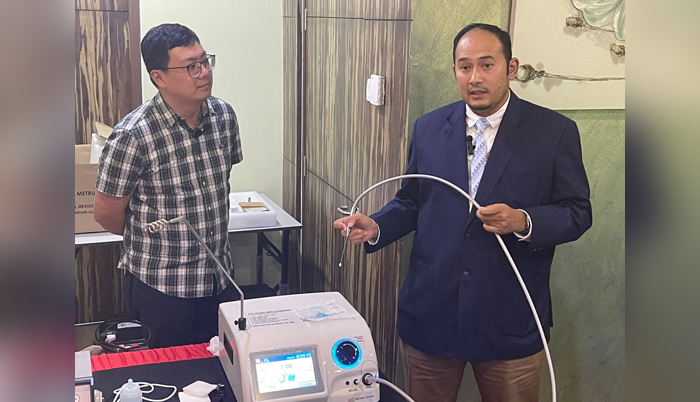![]() Home > Sabah
Home > Sabah
KPJ first in Sabah to offer cryo-analgesic pain relief therapy

Dr Mohd Jazlan (right) demonstrating the use of the cryo-analgesic machine.
![]() April 7th, 2023 | 12:41 PM |
April 7th, 2023 | 12:41 PM | ![]() 329 views
329 views
KOTA KINABALU
KPJ Sabah Specialist Hospital has become the third medical institution in Malaysia and first in Sabah to offer cryo-analgesic pain relief therapy.
KPJ Sabah Orthopedic, Sports Surgery, Pain Interventionist and Robotic Surgery consultant Dr Mohd Jazlan Dato Mohd Adnan said even though the treatment has existed in western countries for around five years already, the Peninsular had only adopted the technology last year while Sabah in February this year.
“This method uses extreme cold to freeze nerves and create ice crystals which destroys the elements of the nerve tissue carrying pain information, ultimately reducing pain caused by the nerve. It does not damage the nerve structure permanently, so the nerve tissues can regenerate slowly with no risk of post-operative neuroma (benign tumour of nerve tissue often associated with pain).
“Cryo-analgesic can be used for any type of musculoskeletal pain but it is mostly effective for back pain, joint pain and knee pain. It can also be used for craniofacial pain, trigger points pain, upper extremity pain secondary to suprascapular neuritis, heel pain, diabetic neuropathy and various types of peripheral neuropathy.
“There are many Malaysians who are suffering from these types of ailments. Some do not think they are ready for surgery while some are already on painkillers or physiotherapy but are still feeling pain. These people especially can try this method as an alternative as our cryo-analgesic patients have reported 70 to 80 percent pain reduction while two of them are pain-free,” he told reporters in a press conference at KPJ Sabah Specialist Hospital on Thursday.
Dr Mohd Jazlan explained that the treatment process, which utilizes a €16,000 machine imported from Poland, starts with sedating the patient and stimulating their nerves to ensure there are no major nerves in the area.
A needle is then injected into the affected nerves and low temperature (-70 to -80 fahrenheit) is used to freeze them into an ice ball, temporarily interrupting the sensory functions in selected structures of the nervous system and creating analgesia (pain relief).
The whole process takes around 30 minutes for one knee, 45 minutes for both knees, and one hour for back pain.
“Cryo-analgesic has many advantages, such as having no risk of secondary pain, high efficiency as the pain reduction lasts six months to two years, no scar formation, and can be repeated so the nerve grows back.
“It also allows for a fast return to normal activity as a patient can be discharged as early as one day after the treatment and can resume their daily activities without having to adhere to any strict dietary rules.
“As for the risks of taking the treatment, I would say that it is very, very low as we do not damage or affect the main nerves. The risk of cryo-analgesic patients suffering neuroma after their treatment is only around one percent,” said Dr Mohd Jazlan.
So far, five people in Sabah have undergone the treatment, including a school teacher from SMK Gadong in Beaufort.
Mohd Haszami bin Mat Zaini, 39, has been suffering from Stage 3 osteoarthritis (a disease which causes tissues in the joint to break down over time) in his knees after long years of being active in sports and outdoor activities.
Last year he had undergone a surgery for the disease, specifically a meniscal tear in his knees, but said that he still felt lingering pain after the surgical operation. Moving or even lying down was painful for him.
This was when a doctor recommended him to take up the cryo-analgesic pain relief treatment.
“The procedure was quick and so was its effect. Just one day after I took the treatment, I could move around without feeling pain. I often pray solat terawih and specifically the pain from my knees hitting the floor had also lessened from about eight percent down to two percent.
“If I am still in this good of a condition three months later, I would definitely recommend it to my friends and family including my mother who also has knee pains, especially as it would incur a lower cost to take the treatment here rather than flying all the way to the Peninsular for the same thing,” he said.
Source:
courtesy of THE BORNEO POST
by JEGATHISAN SIVANESAN
If you have any stories or news that you would like to share with the global online community, please feel free to share it with us by contacting us directly at [email protected]